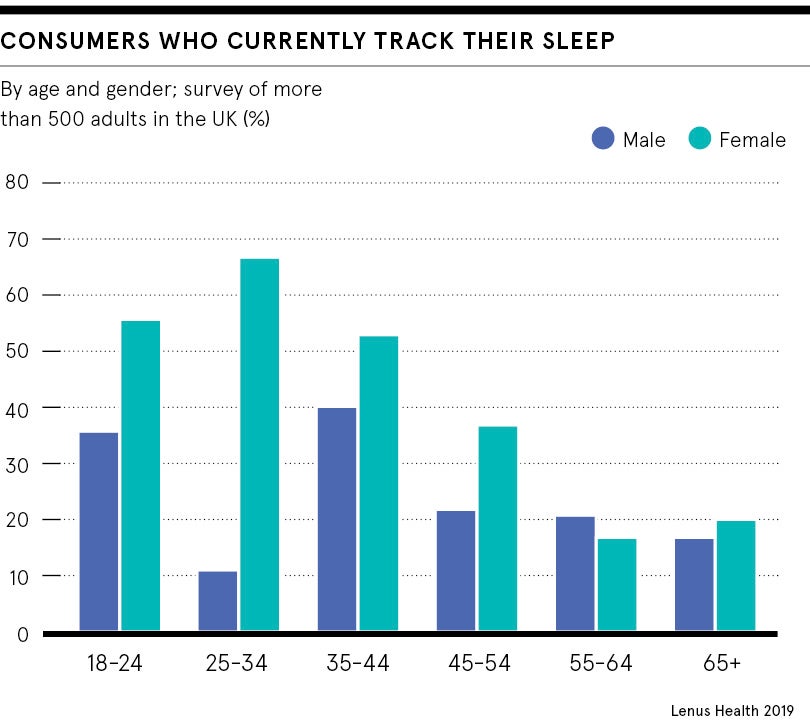The rise of sleep aids and sleep technology are modern solutions to an ancient problem: sleeplessness. As early as 350BC, Aristotle complained of insomnia and historical figures from Napoleon Bonaparte to Charles Dickens often struggled to nod off.
You need only ask parents of a newborn or anyone who’s worked a night shift to understand the delirium that sleep deprivation can bring. Crankiness aside, in the short term, poor sleep can mean poor decision-making and a limited attention span, while possible evidence linking long-term sleep deprivation and Alzheimer’s disease is currently being investigated.
It can also affect your driving in a way that essentially puts you over the alcohol limit, and the relationship between sleep and mental health issues, such as anxiety and depression, has prompted the launch of the NHS-sponsored app Sleepio, which uses techniques from cognitive behavioural therapy to help induce restful sleep.
Why is the sleep aids market growing so fast?
With the sleep aids market tipped to be worth £64 billion by next year, according to Persistence Market Research, and growing public understanding around the long-term health benefits of a good night’s kip, sleep is fast becoming the latest wellness buzzword.
“There’s been a veritable boom in the sleep aids market,” says Shabir Daya, pharmacist and founder of health and wellbeing ecommerce platform Victoria Health.
“Of course, insomnia isn’t new, but perhaps in days gone by, people sort of had a grin-and-bear-it attitude, whereas now they will seek out solutions and not just ones from their GP. As we start to understand more about how cardiovascular disease, for example, is linked to sleep, people don’t just ignore it anymore.”
Mixing GP advice and alternatives to treat insomnia
While in other sectors, trust barriers may prevent consumers from trying new technology or other kinds of alternative aids, sleep doesn’t have such issues. GPs are unlikely to prescribe sleeping tablets in anything other than the most extreme of circumstances, due to their addictive qualities, and are now often suggesting supplements instead.
This provides fertile ground for brands in the sector as they can capitalise on the growing awareness of the importance of sleep and also have a doctor’s seal of approval.
Alexia Inge, co-founder of online cosmetics retailer Cult Beauty, says: “Talking about sleep has gone from being a casual conversation to a bigger movement around mental health and beauty.”
In fact, searches for “sleep” products on the Cult Beauty website are up 121 per cent over the past year. Their best sellers include Slip Silk Pillowcases, and a pillow and body mist from aromatherapist-founded Therapie.
Mr Daya, meanwhile, highlights the Sleep Tight supplement from World Organic as a particular favourite of his, noting its powerful and holistic combination of magnesium, hops and passion flower to support melatonin production.
“Bed is seen as part of self-care and there’s a ritual of ‘nesting in’ somewhat. People want to supplement the advice they get from the doctor’s office and will cherry-pick from both worlds,” adds Ms Inge.
How new technology can help improve sleep quality
However, when it comes to technology, choosing the right product can be a minefield given the surge in the number of devices on the market over the past few years. With countless bedside lamps, wearable devices and sleep-tracking apps now available, catering to all price ranges, the saturation of the technological sleep aids market means manufacturers must differentiate themselves if they hope to stand out from the competition.
If you’re looking to assess the quality of your sleep, the luxury option is the Oura ring sleep and activity tracker. Beloved by the (formerly) sleepless of Silicon Valley, it comes with a £280 price tag. Worn 24 hours a day, it tracks things like heart rate variability and body temperature to determine how long you spend in very deep REM, with rapid eye movements, or deep or light sleep.
At the other end of the market, integrated functions with smartwatches are popular, as well as smartphone apps such as the Sleep Cycle intelligent alarm clock, which analyses sleep patterns and claims to wake you up at the most perfect time, feeling rested.
Dodow is a glowing timer device co-founded by a team of four, including a former L’Oréal staffer and Stanford University engineering graduate. Claiming to be designed by insomniacs, the device uses a light pattern system and a metronome to promote deeper sleep faster.
Established names such as Philips have entered the market with the Somneo Sleep Light, which offers light-guided breathing supposed to relax you to sleep, and sunset simulation that gradually decreases light and sounds over a set duration.
Could a new mattress help you get a good night’s sleep?
Mattresses are also big in the sleep aids space, given that the purchase of a new one no longer only occurs when moving house, unlike in previous generations. And when most companies on the market offer a money-back guarantee or free trial, assessing the options can be tricky.
The unique selling point of Casper, which won a Time magazine Best Inventions of The Year Award when it launched in 2015, is the testing and innovation its mattresses go through, which in some ways resembles that of a tech company. The product team were hired from the likes of Nasa, Google and Apple to put the mattresses through rigorous beta testing.
Considering we are now delaying retirement longer than ever and working practices continue to pressure employees to be contactable outside office hours, career anxieties are unlikely to abate, while the ever-elusive work-life balance seems no closer.
Maximising our rest time and ensuring we get quality, refreshing sleep is therefore becoming an essential buffer for maintaining productivity and safeguarding health. With more demands on our time than ever, both professional and recreational, technology and supplementation could indeed be the key to staying well for longer.
Why is the sleep aids market growing so fast?


